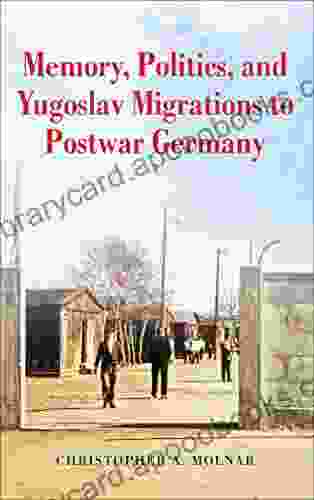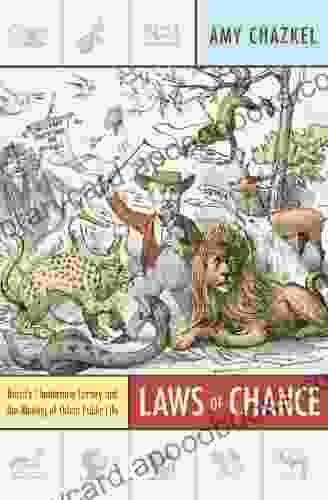Unraveling the Complexities of Memory Politics and Yugoslav Migrations to Postwar Germany

The end of World War II marked a profound turning point in global history, leaving an enduring legacy of displacement and migration. Among those uprooted from their homes were millions of Yugoslavs, who fled their war-torn homeland to seek refuge in various countries, including Germany. The influx of Yugoslav migrants into postwar Germany presented a complex set of challenges and opportunities, both for the migrants themselves and for the host society.
5 out of 5
| Language | : | English |
| File size | : | 3808 KB |
| Text-to-Speech | : | Enabled |
| Enhanced typesetting | : | Enabled |
| Word Wise | : | Enabled |
| Print length | : | 256 pages |
| Lending | : | Enabled |
| Screen Reader | : | Supported |
This article explores the intricate web of memory politics and Yugoslav migrations to postwar Germany. Drawing upon historical documents, personal accounts, and cultural expressions, we examine the multifaceted experiences and narratives of those who were displaced during and after the war. By analyzing the ways in which memory has shaped individual and collective identities, we uncover its profound impact on the post-war landscape in Germany.
The Yugoslav Diaspora: A Legacy of Displacement
The Yugoslav diaspora refers to the dispersed community of Yugoslavs who left their homeland at various points in history, primarily due to political, economic, or environmental reasons. The largest wave of Yugoslav migration occurred during and after World War II, when approximately one-tenth of the population was displaced.
The reasons for this mass displacement were complex and multifaceted. The war itself caused widespread destruction and upheaval, leaving many Yugoslavs homeless and vulnerable. Additionally, the rise of communist rule in Yugoslavia led to political persecution and economic hardship, further fueling the desire to leave the country.
The vast majority of Yugoslav migrants settled in neighboring countries, such as Austria, Italy, and Hungary. However, a significant number also made their way to Germany, which offered greater economic opportunities and a more liberal political climate.
Memory Politics and the Yugoslav Diaspora
The concept of memory politics refers to the ways in which individuals and groups use memory to construct and negotiate their identities and experiences. Memory is not a neutral or objective phenomenon, but rather a selective and contested process that is shaped by power relations and social norms.
In the case of the Yugoslav diaspora, memory politics has played a crucial role in shaping the narratives and experiences of those who were displaced. Migrant communities have sought to preserve their cultural heritage and traditions while also adapting to their new surroundings. This process has often been accompanied by tensions and conflicts over the interpretation of the past and the construction of a collective identity.
Memory politics has also been instrumental in the process of reconciliation and healing. As time has passed, many Yugoslav migrants have returned to their homeland to confront their memories of the war and its aftermath. This process has been facilitated by the emergence of new historical accounts and cultural expressions that have sought to challenge official narratives and promote a more inclusive understanding of the past.
Yugoslav Migrations and the Transformation of Postwar Germany
The influx of Yugoslav migrants into postwar Germany had a profound impact on the host society. The migrants brought with them a diversity of skills, experiences, and perspectives, which contributed to the economic and cultural development of the country.
However, the integration of Yugoslav migrants into German society was not always smooth. Language barriers, cultural differences, and social prejudices created challenges for both the migrants and the host society. In some cases, these tensions erupted into open conflict, as evidenced by the riots that took place in the early 1960s in West Germany.
Despite these challenges, Yugoslav migrants have made significant contributions to postwar Germany. They have played a vital role in the country's economic recovery, its cultural diversity, and its evolving sense of national identity.
The story of Yugoslav migrations to postwar Germany is a complex and multifaceted one, marked by both challenges and opportunities. The influx of migrants has had a profound impact on both the migrants themselves and the host society. Through an analysis of memory politics, we have gained a deeper understanding of the ways in which individuals and groups have negotiated their experiences of displacement and integration.
The legacy of Yugoslav migrations to postwar Germany continues to shape the present day. As the world continues to grapple with the challenges of displacement and migration, the experiences of Yugoslav migrants offer valuable lessons for understanding the complex interplay between memory, identity, and social transformation.
5 out of 5
| Language | : | English |
| File size | : | 3808 KB |
| Text-to-Speech | : | Enabled |
| Enhanced typesetting | : | Enabled |
| Word Wise | : | Enabled |
| Print length | : | 256 pages |
| Lending | : | Enabled |
| Screen Reader | : | Supported |
Do you want to contribute by writing guest posts on this blog?
Please contact us and send us a resume of previous articles that you have written.
 Book
Book Novel
Novel Page
Page Chapter
Chapter Text
Text Story
Story Genre
Genre Reader
Reader Library
Library Paperback
Paperback E-book
E-book Magazine
Magazine Newspaper
Newspaper Paragraph
Paragraph Sentence
Sentence Bookmark
Bookmark Shelf
Shelf Glossary
Glossary Bibliography
Bibliography Foreword
Foreword Preface
Preface Synopsis
Synopsis Annotation
Annotation Footnote
Footnote Manuscript
Manuscript Scroll
Scroll Codex
Codex Tome
Tome Bestseller
Bestseller Classics
Classics Library card
Library card Narrative
Narrative Biography
Biography Autobiography
Autobiography Memoir
Memoir Reference
Reference Encyclopedia
Encyclopedia Henry Wadsworth Longfellow
Henry Wadsworth Longfellow David Boud
David Boud Corban Addison
Corban Addison Amber L Dudley
Amber L Dudley Maggie Hartley
Maggie Hartley Ibragim Kharaev
Ibragim Kharaev A K Koonce
A K Koonce Amy Laura Dombro
Amy Laura Dombro Ama Asantewa Diaka
Ama Asantewa Diaka Andrea Levy
Andrea Levy Amber Harper
Amber Harper Robert Michels
Robert Michels Jay Semko
Jay Semko Amy Spencer
Amy Spencer Amy Newmark
Amy Newmark Ananyo Bhattacharya
Ananyo Bhattacharya Mick Hamer
Mick Hamer L A Starkey
L A Starkey Amy West
Amy West Brittany Ann
Brittany Ann
Light bulbAdvertise smarter! Our strategic ad space ensures maximum exposure. Reserve your spot today!

 Ian PowellSuperhero Joey: The Amazing Adventures of an Ordinary Girl with Extraordinary...
Ian PowellSuperhero Joey: The Amazing Adventures of an Ordinary Girl with Extraordinary...
 Emmett MitchellUnlock Your Creative Potential with 'The Cool and Creative Way to Get It...
Emmett MitchellUnlock Your Creative Potential with 'The Cool and Creative Way to Get It... George OrwellFollow ·11k
George OrwellFollow ·11k F. Scott FitzgeraldFollow ·4.1k
F. Scott FitzgeraldFollow ·4.1k Anton ChekhovFollow ·19.1k
Anton ChekhovFollow ·19.1k Walt WhitmanFollow ·12.9k
Walt WhitmanFollow ·12.9k Arthur Conan DoyleFollow ·4.4k
Arthur Conan DoyleFollow ·4.4k Zadie SmithFollow ·18.3k
Zadie SmithFollow ·18.3k Jared NelsonFollow ·4.6k
Jared NelsonFollow ·4.6k Chad PriceFollow ·11.5k
Chad PriceFollow ·11.5k

 Roald Dahl
Roald DahlImmerse Yourself in a Mesmerizing Tapestry of Creativity:...
Prepare to be captivated by "Spectra," an...

 Clarence Brooks
Clarence BrooksUnleash Your Inner Taylor with Red Piano Vocal Guitar:...
Embrace the Red Era...

 Jeffrey Hayes
Jeffrey HayesUnlock Your Child's Academic Potential: A Comprehensive...
In today's rapidly changing...

 William Golding
William GoldingBrave Elizabeth: A Captivating Tale of Resilience and...
Immerse Yourself in a Riveting Historical...

 Curtis Stewart
Curtis StewartUnveiling the Heartfelt Melodies of Taylor Swift: A...
Step into the enchanting world of Taylor...
5 out of 5
| Language | : | English |
| File size | : | 3808 KB |
| Text-to-Speech | : | Enabled |
| Enhanced typesetting | : | Enabled |
| Word Wise | : | Enabled |
| Print length | : | 256 pages |
| Lending | : | Enabled |
| Screen Reader | : | Supported |










